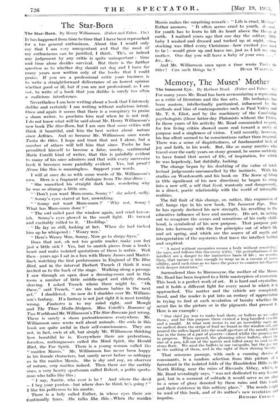The Star-Born
the Star-Born. By Henry Williamson. (Faber and Faber. 15s.)
IT has happened from time to time that I have been reproached for a too general enthusiasm. About this I would only say that I am very unrepentant and that the most of my enthusiasms can be justified, I think. This, or indeed any judgement by any critic' is quite unimportant : time and time alone decides survival. But there is the further question as to whether dog should eat dog and I have for many years now written only of the books that I could praise. If you are a professional critic your business is to write a straightforward deliverance of an honest opinion whether good or ill, but if you are not professional, as I am not, to write of a book that you dislike is surely too often a malicious interference.
Nevertheless I am here writing about a book that I intensely dislike and certainly I am writing without malicious intent. Once and again it seems that there is a conspiracy to praise a sham writer, to proclaim him real when he is not real. I do not know what will be said about Mr. Henry Williamson's new book The Star-Born, but I am sure that some critics will think it beautiful, and him the 'best writer about nature since Jeffries. And so because Mr. Williamson once wrote Tarka the Otter, I hope and trust that not I alone, but a number of others will tell him that since Tarka he has permitted himself to become a false, mushy, sentimental Marie Corelli kind of writer, that this is painfully evident to many of his once admirers and that with every successive book it becomes more painfully evident. Yes, but proof'? Abuse like this is meaningless. Support your words.
I will at once do so with some words of Mr. Williarnson!s own. Here is a fragment of dialogue from The Star-Born : " She smoothed his straight dark hair, wondering why be was so strange a.little son.
' Don't you want Mum-mum, Sonny ? ' she asked, sadly. " Sonny's eyes stared at her, unwinking.
" ' Sonny not want Mum-mum ?" Why not, Sonny .? What has Mum-mum done ? '
" The owl sailed past the window again, and cried kee-or- ich. Sonny's eyes glowed in the small light. He turned and excitably called to it. Hooliflap.'
He lay so still, looking at her. When she had tucked him up he whispered : Weary wee.'
" Here's Weary Wee, Sonny, Now go to sleepy-byes."
Does that not, oh not too gentle reader, make you feel just a little sick ? Yes, but to snatch pieces from a books heart and make isolated quotations of them is unfair. Well then—years ago I sat in a box with Henry James and Maeter- linck watching the first performance in England of The Blue Bird, and in the interval Herbert Trench (I think it was) invited us to the back of the stage. Walking along a passage I saw through an open door a dressing-room and in this room a number of little middle-aged and elderly dwarfs shaving. I asked Trench whom these. might be. " Oh these," said Trench. " are the unborn babies in the next act." I shuddered. So now do I shudder over Mr. William- son's fantasy. If a fantasy is not just right it is most terribly wrong. Fantasies is to my mind right, and Mowgli and The Three Mulla-Mulgars. Miss Corelli's Romance of Two Worlds and Mr. Williamson's The Star-Born are just wrong. There is surely a sham pretentiousness everywhere. Mr. Williamson once wrote well about animals—the owls in this book are quite awful in their self-consciousness. They are not, in fact, owls at all, but simply Mr. Williamson thinking how beautiful he is. Everywhere there are pretentious, formless, nothingnesses called the Mind Spirit, the Herald Bird, the Fur Spirit. There is a young woman called the ", maiden Mamis." Mr. Williamson has never been happy in his female characters, but surely never before so unhappy as in the maiden Mamis. She is shy and coy, an observer of nature, very maiden indeed. Then there are the earthly ones, a very hearty sportsman called Robert, a polite sports- man who talks like this :
I say, Auntie, who ever is he ? And where the devil beg your pardon—but where does he think he:s going ? " .1 like his politeness to his auntie.
There is a lady. called Esther, in whose eyes. there are 4ontinually tears, She talks Jilte..thishen the Maiden Mamis makes the surprising remark : " Life is cruel, Mu! her." Esther answers. " It often seems cruel to youth, de treat, for youth has to learn to lift its heart above the things of earth. I realized years ago that one day the solitary little baby I washed and dressed and tucked up at night, whose stocking was filled every -Christmas—how• excited you used to be !—would grow up and leave me, just as I left my own mother. One day you will have a baby of your own . . &c., &c.,
And Mr. Williamson once upon a time wrote Tarho the














































 Previous page
Previous page